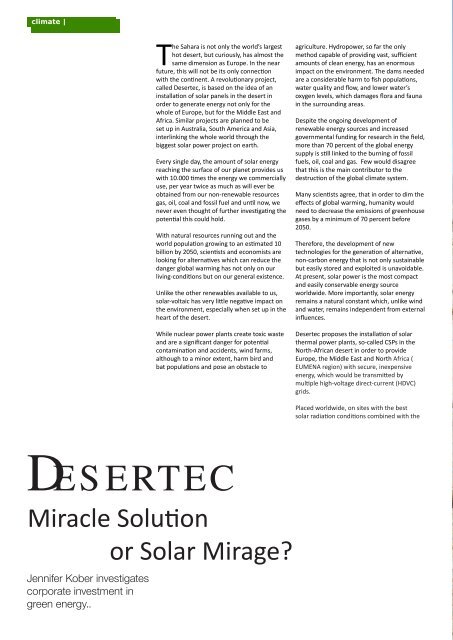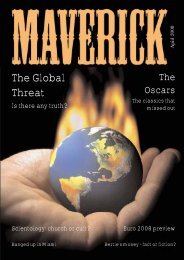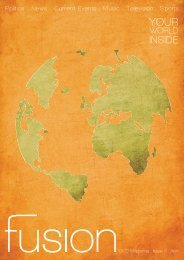Create successful ePaper yourself
Turn your PDF publications into a flip-book with our unique Google optimized e-Paper software.
climate |<br />
climate |<br />
Miracle Solution<br />
The Sahara is not only the world’s largest<br />
hot desert, but curiously, has almost the<br />
same dimension as Europe. In the near<br />
future, this will not be its only connection<br />
with the continent. A revolutionary project,<br />
called Desertec, is based on the idea of an<br />
installation of solar panels in the desert in<br />
order <strong>to</strong> generate energy not only for the<br />
whole of Europe, but for the Middle East and<br />
Africa. Similar projects are planned <strong>to</strong> be<br />
set up in Australia, South America and Asia,<br />
interlinking the whole world through the<br />
biggest solar power project on earth.<br />
Every single day, the amount of solar energy<br />
reaching the surface of our planet provides us<br />
with 10.000 times the energy we commercially<br />
use, per year twice as much as will ever be<br />
obtained from our non-renewable resources<br />
gas, oil, coal and fossil fuel and until now, we<br />
never even thought of further investigating the<br />
potential this could hold.<br />
With natural resources running out and the<br />
world population growing <strong>to</strong> an estimated 10<br />
billion by 2050, scientists and economists are<br />
looking for alternatives which can reduce the<br />
danger global warming has not only on our<br />
living-conditions but on our general existence.<br />
Unlike the other renewables available <strong>to</strong> us,<br />
solar-voltaic has very little negative impact on<br />
the environment, especially when set up in the<br />
heart of the desert.<br />
While nuclear power plants create <strong>to</strong>xic waste<br />
and are a significant danger for potential<br />
contamination and accidents, wind farms,<br />
although <strong>to</strong> a minor extent, harm bird and<br />
bat populations and pose an obstacle <strong>to</strong><br />
Desertec<br />
agriculture. Hydropower, so far the only<br />
method capable of providing vast, sufficient<br />
amounts of clean energy, has an enormous<br />
impact on the environment. The dams needed<br />
are a considerable harm <strong>to</strong> fish populations,<br />
water quality and flow, and lower water’s<br />
oxygen levels, which damages flora and fauna<br />
in the surrounding areas.<br />
Despite the ongoing development of<br />
renewable energy sources and increased<br />
governmental funding for research in the field,<br />
more than 70 percent of the global energy<br />
supply is still linked <strong>to</strong> the burning of fossil<br />
fuels, oil, coal and gas. Few would disagree<br />
that this is the main contribu<strong>to</strong>r <strong>to</strong> the<br />
destruction of the global climate system.<br />
Many scientists agree, that in order <strong>to</strong> dim the<br />
effects of global warming, humanity would<br />
need <strong>to</strong> decrease the emissions of greenhouse<br />
gases by a minimum of 70 percent before<br />
2050.<br />
Therefore, the development of new<br />
technologies for the generation of alternative,<br />
non-carbon energy that is not only sustainable<br />
but easily s<strong>to</strong>red and exploited is unavoidable.<br />
At present, solar power is the most compact<br />
and easily conservable energy source<br />
worldwide. More importantly, solar energy<br />
remains a natural constant which, unlike wind<br />
and water, remains independent from external<br />
influences.<br />
Desertec proposes the installation of solar<br />
thermal power plants, so-called CSPs in the<br />
North-African desert in order <strong>to</strong> provide<br />
Europe, the Middle East and North Africa (<br />
EUMENA region) with secure, inexpensive<br />
energy, which would be transmitted by<br />
multiple high-voltage direct-current (HDVC)<br />
grids.<br />
Placed worldwide, on sites with the best<br />
solar radiation conditions combined with the<br />
latest technology available, the solar plants<br />
could be operated 24 hours a day with an<br />
estimated lifespan of 40 years. Thermal<br />
energy will be generated through the use of<br />
large mirror panels in order <strong>to</strong> concentrate<br />
the sun‘s heat throughout the day, which<br />
will be s<strong>to</strong>red in tanks and run through<br />
steam circuits according <strong>to</strong> demand.<br />
By using a specific air-cooling system, the<br />
plants do not use drinking water needed<br />
in particularly arid regions, although<br />
this method is slightly less efficient than<br />
traditional water-cooling systems. This way,<br />
the project will not interfere with important<br />
water supply for desert populations. On the<br />
contrary, in the coastal areas, saltwater will<br />
be used for the cooling process in order <strong>to</strong><br />
create drinking water through desalination.<br />
Currently, the project is directed <strong>to</strong>wards<br />
the aim of providing 15 percent of Europe‘s<br />
energy by means of pho<strong>to</strong>-voltaic. However<br />
in the long term, it is expected <strong>to</strong> provide<br />
for as much as 90 percent of the global<br />
population. Due <strong>to</strong> its geographical<br />
proximity, Desertec is focussing its strategies<br />
on the MENA region first, but is presently<br />
promoting the model in America, China,<br />
India and Australia with the aim of creating<br />
regional networks based on the concept of<br />
energy-generation in desert areas.<br />
“Desertec claims if only<br />
1% of the Sahara were<br />
covered, it would provide<br />
enough energy for the<br />
whole world.”<br />
It is estimated that the 100 GW network<br />
for the entire EUMENA region will cost 45<br />
billion euro. However, spread amongst 30<br />
participating countries and ten years, this<br />
will break down <strong>to</strong> 150 million euro per<br />
state, an average of less than 1,000 euro<br />
per European inhabitant. Like all alternative<br />
energy projects, Desertec will depend on<br />
public funding.<br />
Desertec claims if only one percent of the<br />
Sahara were covered, it would provide<br />
enough energy for the whole world.<br />
The global interest in the idea of<br />
revolutionising the energy-market forces<br />
and expanding technological evolution is<br />
immense, with more than one thousand<br />
companies inquiring about Desertec every<br />
single day.<br />
The political world of Europe seems<br />
determined <strong>to</strong> support the project so far,<br />
with German chancellor Angela Merkel and<br />
President of the European Commission Jose<br />
Manuel Barroso having already insured<br />
financial aid.<br />
With great power comes responsibility.<br />
Concerns voiced by critics include the<br />
necessary diplomatic and political<br />
agreements concerning energy, investment<br />
and trade between Europe and North<br />
African nations such as Morocco and<br />
Algeria, which could significantly postpone<br />
the installations.<br />
The fear that terrorist attacks as well<br />
as corruption might push Europe<br />
in<strong>to</strong> an economic and political corner<br />
is unreasonable as there will be no<br />
centralised provider, instead the 20 or<br />
more transmission lines will run through a<br />
number of countries, Egypt, Jordan, Syria,<br />
Turkey, Tunisia, Italy, Morocco and Spain,<br />
ensuring energy back-up and provision<br />
security.<br />
The Moroccan government, which currently<br />
imports 96 per cent of its energy, shows<br />
itself in favour of Desertec. Said Mouline,<br />
head of the CDER, Morocco‘s renewable<br />
energy agency, who played a key role in<br />
recent developments by suggesting the<br />
country for the project, clarifies the reason<br />
for his enthusiasm: “Morocco doesn’t<br />
have even one percent of Europe’s energy<br />
consumption, so let’s be realistic. We would<br />
be generating enough power for us, and for<br />
export, for the next 100 years.”<br />
“existing powerstructures<br />
will shift as the<br />
Middle East and Saudi<br />
Arabia no longer will be<br />
able <strong>to</strong> dictate the oil<br />
price”<br />
Moreover, Desertec can be seen as an<br />
insurance against rising conflict in unstable<br />
countries. In North Africa itself, the<br />
construction of the solar panels will create<br />
thousands of jobs for local engineers alone.<br />
It will be up <strong>to</strong> the countries <strong>to</strong> decide<br />
whether they want <strong>to</strong> primarily use the<br />
energy generated or export it.<br />
The sheer existence of power plants<br />
however will ensure electricity for local<br />
villages and <strong>to</strong>wns, which so far were<br />
completely cut off.<br />
As poverty is often linked <strong>to</strong> power<br />
shortage and access <strong>to</strong> affordable, reliable<br />
and environmentally sensible energy,<br />
this will significantly help the economic<br />
development of the regions involved.<br />
Also, it will prevent contemporary projects<br />
planning the construction of Nuclear Power<br />
plants, which, if subject <strong>to</strong> terrorist attacks,<br />
would have severe consequences.<br />
Of course, existing power-structures will<br />
shift as the Middle East and Saudi Arabia<br />
no longer will be able <strong>to</strong> dictate the oil<br />
price and use their resources for political<br />
pressure.<br />
Nevertheless this will not amount <strong>to</strong> the<br />
insignificance of oil and gas for countries<br />
rich in those natural deposits. Being<br />
provided with solar power will mean their<br />
focus can shift <strong>to</strong> export only, which will be<br />
in the countries‘ interest and help further<br />
carbon preservation.<br />
We live in a world now that is more divided<br />
than ever. For 25 per cent of the global<br />
population <strong>to</strong> continue <strong>to</strong> enjoy the highest<br />
consumption pattern in human his<strong>to</strong>ry,<br />
75 per cent of humanity will experience<br />
the daily reality of inhumane poverty,<br />
contaminated drinking water, disease,<br />
unemployment and hunger.<br />
Desertec claims <strong>to</strong> insert a very humane,<br />
reasonable and scientifically airtight<br />
business approach in<strong>to</strong> the global agenda.<br />
The variety of companies signing up for<br />
the long-term investment in eco-friendly,<br />
humanitarian innovation, hints <strong>to</strong> the<br />
inclination <strong>to</strong> contribute <strong>to</strong> a long overdue<br />
revolution for outdated energy policies and<br />
established economic power-relations. If<br />
we don‘t address these issues now, we will<br />
regret it later.<br />
or Solar Mirage<br />
Jennifer Kober investigates<br />
corporate investment in<br />
green energy..<br />
19

















